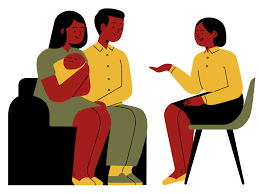Post-traumatic stress disorder (PTSD) is a mental health condition that can affect both individuals and their families. That’s why it’s important to seek help not only for those who have experienced trauma but also for the people around them. In this post, we will explore the techniques used in family therapy for PTSD and how they work to improve the lives of everyone involved. So let’s dive right in!
Contents
What is Family Therapy?

In family therapy, the focus is on improving communication and relationships within the family. The therapist works with the family to identify and change patterns of behavior that may be contributing to the problem. Family therapy can be an effective treatment for PTSD because it can help families to understand and support each other, as well as learn new coping skills.
Family therapy also helps the person with PTSD to recognize and accept their feelings, build a support system, and learn how to cope effectively. Also, Family therapy can help family members understand why the trauma happened, how it affects everyone in the family, and what each member can do to support healing.
How Does Family Therapy Work For PTSD?
Many people who suffer from PTSD find family therapy to be a helpful and effective treatment option. Family therapy can help to provide support and understanding, as well as identify and address any underlying issues that may be contributing to the individual’s PTSD.
Family therapy typically involves weekly sessions with a therapist, in which family members are encouraged to openly share their thoughts and feelings about the individual’s PTSD. The therapist will also work with the family to develop coping and communication strategies.
One of the main goals of family therapy is to help individuals with PTSD feel supported and understood by their loved ones. This can be a vital step in recovery, as individuals often feel isolated and alone after experiencing a traumatic event.
The working of family therapy for PTSD is based on understanding and acceptance. The therapist will work with the family members to help them better understand the individual’s condition and compassionately offer support. This can help to reduce feelings of guilt, blame, or shame that may be present within the family.
Techniques Used In Family Therapy For PTSD

There are several different techniques used in family therapy for PTSD. Some of the techniques of family therapy are designed to reduce the symptoms of PTSD and help with recovery, while others focus on fostering better communication, providing support, and building resilience.
Psychoeducation
One of the most common techniques used in family therapy for PTSD is psychoeducation. This technique involves providing information to members of the family about PTSD symptoms and how they may be affecting the individual as well as the entire family system. The goal of psychoeducation is to create a better understanding among family members so that they can support the person with PTSD more effectively.
Structural Techniques
Another technique used in family therapy for PTSD is structural techniques. This involves therapists helping the family to identify and address any existing problems or issues that the individual with PTSD is struggling with, such as communication difficulties, lack of support, or stress-related behaviors. The therapist will then work with the family to create a plan of action that can help ensure that these issues are addressed and reduced.
Emotional Regulation
Family therapy for PTSD also often includes emotional regulation techniques. This means helping family members to recognize and manage their own emotions, as well as the emotions of the individual with PTSD. This can involve teaching the family how to identify and express emotion in more productive ways, as well as focusing on developing strategies that can help the family to support each other in times of stress.
Family Systems Therapy
Another technique used in family therapy for PTSD is family systems therapy, which focuses on helping the family as a whole to understand and work through any issues they may be facing. This type of therapy looks at how individual family members interact with one another and how their interactions affect the family as a whole. By helping to foster better understanding and communication among family members, this type of therapy can help reduce stress and improve overall functioning.
Strategic Techniques
Some family therapy for PTSD may also include strategic techniques. This type of therapy focuses on creating and implementing strategies that can help the family to cope with stressors and manage symptoms better. Strategic techniques are designed to increase communication, build problem-solving skills, and create a more supportive environment for everyone in the family.
Benefits of Family Therapy For PTSD

Some of the benefits of family therapy for PTSD include:
Closer Relationship With Family
One of the primary benefits of family therapy for PTSD is that it allows those suffering from the disorder to develop closer relationships with family members. This can help to provide a greater sense of security and trust, which can be especially important when dealing with such a severe mental health issue.
Improved Coping Skills
Family therapy can also help teach individuals better-coping skills. This is especially important for those with PTSD, as many of the symptoms can be difficult to manage. Through family therapy, individuals can learn how to better handle and cope with their thoughts and emotions to reduce their symptoms.
Support System
Family therapy also provides an invaluable support system for those suffering from PTSD. Having a strong support system of family and friends is essential for managing mental health disorders, and family therapy can help to provide this vital support.
Improved Communication
Family therapy also helps to improve communication within a family. This can help reduce conflicts, which is especially important for those with PTSD who may be more sensitive to certain triggers. Improved communication can also lead to better problem-solving, which is necessary when dealing with mental health issues.
Improved Understanding
Finally, family therapy can help to create a greater understanding of PTSD within the family. This increased understanding can lead to better support and care for those affected by the disorder, which is essential to get them the help they need.
Ultimately, family therapy can be an invaluable tool in helping those with PTSD manage their symptoms and live a better quality of life.
Limitations of Family Therapy For PTSD

There are several limitations to family therapy for PTSD that should be considered before starting treatment. Some of these limitations are:
- Effectiveness: One of the primary limitations of family therapy for PTSD is its effectiveness. While research has shown that family therapy can be successful in managing the symptoms of PTSD, it is not as effective as other types of treatments such as individual psychotherapy or medication.
- Time: Another limitation to family therapy for PTSD is time. Family therapy sessions are typically longer than individual sessions and may require multiple sessions over several weeks or months for the family to effectively work through their issues with PTSD.
- Cost: Family therapy can also be costly, as it typically requires more than one session and needs to be provided by a trained therapist. Additionally, depending on the practitioner’s rates and insurance coverage, there may be additional costs associated with family therapy for PTSD.
- Inability to Change a Family: One of the major limitations of family therapy is its inability to change an entire family system. While it can help individuals cope better with PTSD, it may not be able to completely eradicate the problem from a family system.
Conclusion
Family therapy can be an effective part of a PTSD treatment plan. It can help individuals and their families cope with the symptoms of PTSD, increase understanding between family members, and create a supportive environment that can help promote healing. The techniques discussed in this article are just some of the ways family therapy has been used to treat PTSD; it is important to speak to your therapist about which ones might work best for you and your family. With the right support system in place, those living with PTSD can find peace and hope amidst difficult times.
For more information, please contact MantraCare. Parenting is a challenging yet rewarding experience that is crucial for the development and well-being of a child. If you have any queries regarding Online Parenting Counseling experienced therapists at MantraCare can help: Book a trial therapy session


